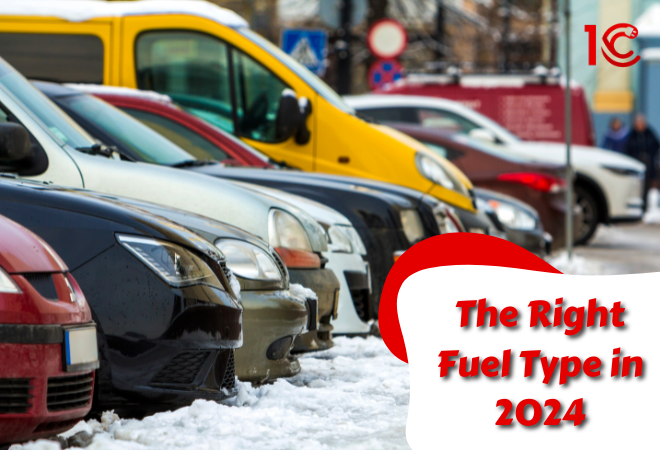Menu
Menu


Updated on Feb 2, 2024 | 6 min read
A few years back, there were mostly two car options. It was either a CNG car or a Petrol Car. But as time passes, the price of petrol increased and the availability of fuel is not easy, there are more options available in cars now. Apart from CNG and petrol, there are Diesel, Hybrid and EVs too. Now, as there are so many options available, you might face problems in choosing the right option for yourself. In this blog, we have provided a clear difference between all these options, which will help you in making the right selection for your dream vehicle. Let’s see each option one by one.
Connect with 1C for expert advice on EV chargers
A petrol car features an internal combustion engine, which transfers power to the wheels via a gearbox. It uses petrol to generate energy, unlike a BEV (Battery Electric Vehicle) that relies on electricity. While an electric motor delivers instant torque, a petrol engine requires revving to access its full power and torque potential.
CNG cars, or compressed natural gas cars, are vehicles that use compressed natural gas as a fuel source instead of traditional gasoline or diesel. Compressed natural gas is a cleaner-burning alternative fuel derived from natural gas, primarily composed of methane. CNG vehicles typically feature specially designed engines or engine modifications to accommodate the combustion characteristics of natural gas.
The fuel is stored onboard the vehicle in high-pressure tanks, which compress the gas to reduce its volume and increase its energy density, enabling the vehicle to carry sufficient fuel for practical driving ranges.
Connect with 1C for expert advice on EV chargers
A diesel car is a type of vehicle that is powered by a diesel engine, which operates by igniting fuel injected into the combustion chamber rather than using spark plugs. Diesel engines are known for their efficiency and torque output, making them suitable for applications where high towing capacity or fuel economy is desired. Diesel cars typically have better fuel efficiency than gasoline-powered vehicles and are commonly used in trucks, SUVs, and certain passenger cars. They are distinguished from petrol (gasoline) cars by their use of diesel fuel and the different combustion process used to generate power. Diesel cars may also have different performance characteristics compared to petrol cars, such as slower acceleration but greater pulling power.
A hybrid car is a vehicle that uses both an internal combustion engine (typically petrol) and an electric motor to propel itself. These cars feature a battery pack that stores energy generated through regenerative braking and from the internal combustion engine. The electric motor assists the engine during acceleration and low-speed driving, reducing fuel consumption and emissions. Hybrid cars can switch between electric and petrol power or operate both simultaneously, offering improved fuel efficiency and reduced environmental impact compared to traditional petrol vehicles.
An electric vehicle is a type of automobile that operates solely or primarily on electricity stored in batteries. Unlike conventional internal combustion engine vehicles, which rely on petrol or diesel, EVs use electric motors powered by rechargeable batteries for propulsion. These vehicles produce zero tailpipe emissions, making them environmentally friendly and reducing air pollution. EVs come in various forms, including battery electric vehicles (BEVs), which run entirely on electricity, and plug-in hybrid electric vehicles (PHEVs), which combine an electric motor with an internal combustion engine.
Choosing the right car in 2024 involves considering various fuel options, each with its benefits and drawbacks. Petrol cars offer widespread availability and quick refueling, while CNG cars provide cleaner fuel at a cost-effective rate. Diesel cars offer fuel efficiency and torque, while hybrid cars combine petrol and electric power for enhanced efficiency. Electric vehicles stand out for zero emissions and lower operating costs, despite charging infrastructure challenges. Each option caters to different preferences and priorities, emphasizing the importance of informed decision-making based on individual needs and considerations.
© 2024 Massive Mobility Private Limited. All rights Reserved